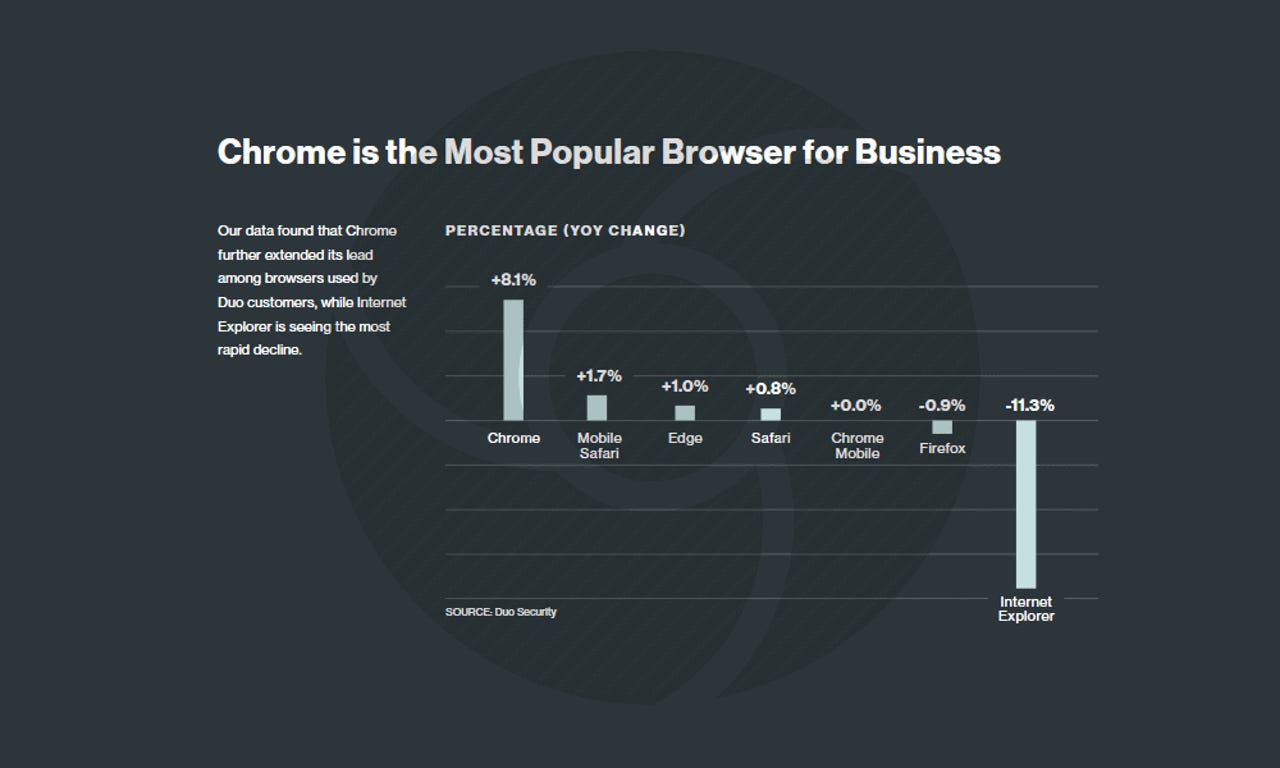2019's tech, security, and authentication trends


Google Chrome dominant in the enterprise
Google Chrome continues to be the favorite browser installed on enterprise devices, and its market share is growing every year, according to the findings of the 2019 Duo Trusted Access Report, which aggregated data from over 25 million devices with Duo authentication solutions installed.
Adobe Flash Player market share going down
The percentage of browsers where Flash is still installed has gone down to 29% in 2019, down from a whopping 76% in 2017.
Edge is the most out-of-date browser
The most frequent out-of-date browser is Microsoft Edge, with 73% of all instances running an older version. In comparison, the most up-to-date browser is Internet Explorer, but the last IE version came out almost a decade ago, and users have had plenty of time to update. In reality, users shouldn't be using IE at all.
Android leads out-of-date devices
While the number of out-of-date Android devices has gone down since last year, Android smartphones and tablets continue to remain the most out-of-date devices overall, followed by those running macOS, ChromeOS, and iOS.
Windows 10 adoption up, Windows 7 going down
After years of trying to convince users to give up on Windows 7 and move on to Windows 10, Microsoft's efforts are finally paying off. According to Duo, over the last two years, Windows 7's enterprise market share has gone down from 65% in 2017, to only 29% in 2019, while Windows 10 has gone from 27% to 66%.
Windows 7 & 10 adoption per industry
The industry verticals where Windows 10 is dominating Windows 7 are wholesale & distribution, business services, and non-profits. On the other hand, Windows 7 still maintains a stronghold in transportation & storage, computer & electronics (ironically), and healthcare.
More iOS devices
Duo, which was recently acquired by Cisco, says that while Windows is the dominant OS in the enterprise sector, iOS has been the operating system who gained the most users in the first half of 2019.
Cloud usage increases
The number of app integrations and authentication requests for cloud-based services has gone through the roof in 2019, showing that cloud-based apps are becoming more popular by the day, and confirming an industry trend where businesses are moving their internal apps to cloud-based infrastructures, for mobility and convenience.
Top enterprise policies
The most popular enterprise policies configured in Duo's authentication solutions were: login location restrictions (51% of companies used this policy), device must use a screen-lock (27%), device must use disk encryption (22%), and companies disallow logins from anonymous IP addresses (20%).
China leads top restricted locations
Breaking down the most popular enterprise policy configured by companies, Duo says most businesses chose to block logins from countries such as China, Russia, the US, India, or France.
SMS-based authentication is falling
The number of companies who use SMS-based authentication has gone down to less than 3% in 2019, according to Duo, who previously saw levels of between 6 and 8% n 2016.
Biometrics use is rising
But while SMS 2FA is going down, biometrics-based login solutions are on the rise. Duo says the number of devices where a biometrics-based login solution was enabled has grown from 68% in 2016 to 77% in 2019.
Phishing is less effective
And the final food news is that Duo users are falling to fewer and fewer (test) phishing attacks. The number of users who lost credentials in Duo-managed phishing tests has gone down from 65% in 2017 to 47% in 2019. The number is not great, but it's an improvement after all.